C.S. Burrough's Blog, page 5
March 29, 2025
My review of She-Wolves: The Women Who Ruled England Before Elizabeth, by Helen Castor
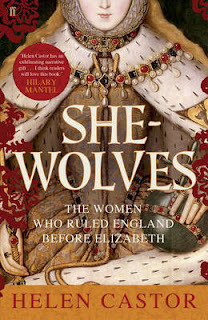
This quality writing explores a stimulating proposition which, as a seasoned Tudor reader, I had long pondered: why all the fuss over Princess Mary Tudor (later 'Bloody' Queen Mary I) in her youth, being a female heir? Why did her father Henry VIII go to such extremes as discarding his marriage, splitting with the church of Rome etc., in his panic to get a male heir, when women had already long since led the nation?
Similarly, why all the further despair when Elizabeth I succeeded Mary? And why, during Elizabeth's long reign, was there so much angst over her most obvious heir, Mary of Scots, possibly succeeding (the latter's religion and controversies aside)? This chauvinistic, perhaps ill-informed generation of statesmen seemingly underestimated that female leadership was not new ground.
I loved, as always, reading about the fabulously fierce Margaret of Anjou, who no one would want to cross.
Ferocious Matilda is also always a great character to revisit. She really set the bar for others – unless we go back much further to Boudica who, while never ruling the entire nation, put up one hell of a fight against the invading Romans consolidated tribal kingdoms such as hers and ruled the land, successfully annexing most of Britain as a colony of their Empire.
Isabella of France, too, is always great reading value. This 'don't mess with me' queen never fails to make me grin for ear to ear with admiration.
Austere Eleanor of Aquitaine is perhaps my least favourite subject here, her period being my least favourite. It would have been improper to exclude her though. Her history I find too dragged out, by all her biographers. I'd have liked to have seen the proportion of this book given to Eleanor allocated instead to Mary I, but that's my ingrained Tudor fanaticism for you.
I like Helen Castor's more formal, unsentimental style. She meanders less than some on more personal details, which perhaps makes for a more remote study of each queen. This, combined with the requisitely compact nature of this lofty work, left me less intimately acquainted with each subject than I have through other biographers of the same queens. These others have the advantage of space to delve into the 'popular history' realms of emotional motive, leisurely interests, wardrobe preferences, dietary quirks, etc.
I find Castor closer to David Starkey or Eric Ives than Antonia Fraser or Alison Weir. A curiously masculine narrative by a woman on what is such a feministic endeavour. This factor offers balance, saving the work from degeneration into what might have become just another medieval Girl Power rant.
A good solid read, if more academically styled than my usual choices. I was not disappointed.
My review of Mildred Pierce, by James M. Cain
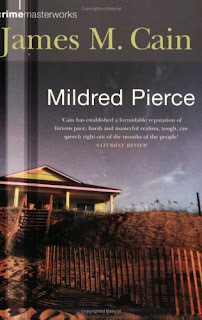
I relished James M. Cain's 1941 classic from which two great screen adaptations of the same title have emerged: Joan Crawford's first starring Warner Bros role after leaving MGM, winning her the 1945 Best Actress Academy Award, with Eve Arden, Ann Blyth, Jack Carson and Zachary Scott. And Director-Screenwriter Todd Haynes's 2011 multi-Award-winning five-part miniseries, starring Kate Winslet, Guy Pearce and Evan Rachel Wood. Far truer to the novel than the movie was, the miniseries is an almost scene-for-scene dramatization, including Cain's original dialogue.
Set in 1930s Glendale, California, the plot follows middle-class housewife Mildred, whose money was lost in the Great Depression. An overprotective, self-sacrificing mother, after separating from her unemployed husband Bert, Mildred sets out to support herself and two daughters. After much door knocking, she finds waitressing work but worries that her spoilt older daughter, Veda, will think her new job demeaning.
Desperate to retain Veda's approval, Mildred, still waitressing her fingers to the bone, starts a home baked pie sideline, partly to make ends meet but mostly to keep Veda in the style to which she's become accustomed. Her pies a surprise hit, Mildred opens a restaurant. She also falls for handsome Monty Beragon, a younger man whose great family wealth had similarly evaporated in the Great Depression.
A successful businesswoman, Mildred opens a second restaurant, then a third. Though initially enjoying her mother's newfound success, Veda remains contemptuous of the working classes which, to her, includes self-made traders like her mother. Veda becomes increasingly ungrateful, demanding more and more from Mildred while openly sneering at her. Soon, no measure of money or gifts will keep the disdainful Veda onside. Compounding Mildred's turmoil, Veda's younger sister, Moire (nicknamed 'Ray'), falls suddenly ill and dies. But plucky Mildred keeps going.
Uncovering Veda's plot to blackmail a wealthy family with a fake pregnancy is the final straw, and Mildred kicks her out. Having had extensive opera training, financed by Mildred's hard-earned dollars, Veda lands on her feet, but Mildred perversely yearns for her estranged ungrateful daughter. She convinces Monty, now her husband, to sell her his family estate, luring Veda back into her life with wealth.
Discovering that Mildred's extravagance has eaten into company profits, her business partner Wally faces her down, threatening a corporate overthrow. Revisiting ex-husband Bert, she confesses to systematically syphoning money from her own company in a desperate, ongoing quest to rebuy Veda's affection.
Seeking the now successful Veda's financial help to rebalance the books – and protectively concerned Wally may target Veda's assets – Mildred goes to face her, only to find her in bed with Monty. He announces he's leaving Mildred for Veda, who sneers that this was their plan from the outset. Pushed to despair, Mildred tries to throttle her daughter who, as a result, loses her singing voice and therefore her job.
Compelled to forfeit her business empire, Mildred transfers it to former company assistant and longtime friend Ida. She then relocates to Reno, Nevada, where the law allows her a rapid divorce from Monty. Ex husband Bert moves out to visit and, with Mildred's divorce settlement finalised, proposes remarriage.
With Veda's singing career in tatters after her loss of voice, her reputation is also tarnished from having slept with stepfather Monty. In professional damage control she arrives on Mildred's doorstep with a press entourage, to publicly reconcile with her mother. Mildred gullibly takes her in, only to realise months later she's been had when Veda callously announces her ruthless new plans.
Finally waving Veda farewell from the doorstep, a Mildred says 'to hell' with Veda and heads indoors to 'get stinko' with stalwart twice-over husband Bert.
Oh, Mildred, Mildred, Mildred, whatta gal! I was frequently urged to kiss her and slap her into sense. So sucked in was I that I reread it - a second time, then a third. This is something special, with its poignant, noir-tinged stylistic treatment.
I never wanted this to end. Can't imagine any reader of any age or group not devouring this iconic tale of a great and endearing woman and her forgivably anomalous weaknesses.
February 24, 2025
My review of Room at the Top, by John Braine

This good old (1957) nostalgic late-night read had me gripped from start to finish. John Braine's gritty post-war British characters are astonishingly true, their strengths believable, their defects authentic, their dialogue the real McCoy.
After studying accountancy as a Prisoner of War, ex-serviceman Joe Lampton leaves his northern English hometown of Dufton, where he grew up a poor orphan after his parents were killed in an air raid.
Chasing a new life, Joe arrives in nearby Warley to commence his promising new job at the Municipal Treasury. Ambitious to break the archetypal working-class mould, Joe runs with the fast-changing times and sets his sights high, driven by visions of white-collar advancement.
He rents a room from the middle-class Thompson's, a couple in Warley's well-to-do quarter 'The Top' (T'top, in native dialectic terms). Joe Lampton's 'room at the top' is a metaphor for his drive to leave behind the blue-collar 'zombies' of his old life and native town.
The kindly Thompsons, deprived of a son who died at war, take Joe under their wing and treat him like family. They introduce him to their amateur dramatic society where, at weekly evening rehearsals, he befriends childlike Susan Brown, the sole daughter of an influential Warley businessman. Though betrothed to flash Jack Wales, heir to a local family fortune, Susan also quietly succumbs to Joe's pushy wooing. She remains naïve of his motive being partly frivolous opportunism, in his ruthless quest for social elevation, and partly blokey one upmanship against the self-important Jack Wales.
At these same weekly rehearsals, Joe also becomes acquainted with the older, married Alice Aisgill, who usually gets the company's leading lady roles. Though she initially plays the ice queen, Alice and Joe soon find mutual stimulation in intelligent conversation, away from the others, after rehearsals, in the nearby pub. They begin a covert sexual relationship, enacted mostly in the borrowed flat of one of Alice's actress girlfriends. One secret weekend, at a country cottage, smooth talking Joe convinces Alice this is more than physical. She is won over.
Though Joe does love Alice more passionately, he has also, meanwhile, successfully seduced the wide-eyed and willing young Susan Brown, who falls pregnant.
As rumour erupts of Joe's adulterous affair with Alice, his reputation is compromised, threatening his prospects in Warley. His only option of keeping Alice would be elopement with her, away from her husband and Warley, leaving behind Susan and his career opportunities.
Meanwhile with scandal looming, Susan's father, concerned for his family reputation, summonses Joe to a private business meeting. He presses Joe do the decent thing by marrying the pregnant Susan, adding, for incentive, a job offer worth a thousand a pounds year. The one stipulation is that Joe sever all ties with Alice Aisgill.
Forced to choose between love and money, Joe must sacrifice one relationship to retain the other. The outcome for the devastated woman he doesn't choose is tragic. Guilt ridden and remorseful, Joe turns to drink in a rage of self-loathing.
Room at the Top's hero intermittently morphs into anti-hero throughout, via the twists and turns of his wrestling conscience and ego. Empathising with him, we also recognise his shortcomings too. His older lover, Alice Aisgill, is entrancing, enigmatic and breathtakingly believable. She was immortalised on the big screen by the wonderful Simon Signoret, whose smouldering portrayal earned her an Academy Ward (1959), then again on the small screen by the fabulous Maxine Peake (2012), that miniseries winning a BAFTA.
In the same period bundle as Stan Barstow's A Kind of Loving and Nell Dunn's Up the Junction (both similarly cinematised), this was a genre that gained swift popularity then achieved a sort of cult status as it just as rapidly dated. The post-war era, one of rapidly altering morals and class boundaries, is superbly captured in these then controversial novels. This is one of the best.
No great classic, in my opinion, but a broody, meaty read with a granite edge that leaves an indelible impression.
Quite unforgettable.
My review of Lost Empires, by J.B. Priestley
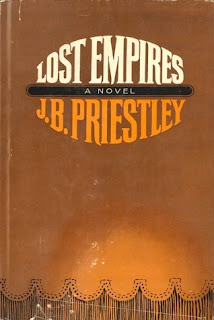
I love this 1965 J. B. Priestley novel so much I've read it four times. A young man's peep into a smoke-swirling, footlit world as he verges on adulthood, this is classy, intriguing and sad to put down when finished.
In the last months of peace before World War I, ambitious young painter-cum-clerk Richard Herncastle's mother's dies. Not yet of age, he is taken under the wing of his maternal uncle Nick Ollanton, known publicly as 'Ganga Dun, the greatest conjurer on the English stage'.
Leaving his dull office job to join Uncle Nick's act, Richard meets his team and the other touring 'artistes' on the bill, a boozy, nomadic troupe comprised of dancers, comedians, jugglers and so on. They tour Britain performing on the legendary soon-to-vanish Empire variety theatre circuit.
Good looking young Herncastle sees all of life from backstage in music hall variety, just as his uncle has promised. He learns the ropes of stagecraft, falls in love with a depraved beauty, sees a long-lost Britain in a way future generations will only hear about and even becomes privy to an intriguing murder investigation. Richard comes of age in 1914, just as the greatest disappearing act of all is looming: society as it would never again be known.
This fictional old man's fond retelling of his remarkable youth never fails to satisfy, no matter how many times I return to it, if only to flick through and browse my favourite episodes. The haunting smell of greasepaint emanates from the pages of an evocative tale about a special time and profession.
The multi award nominated 1986 miniseries featured Sir Laurence Olivier's penultimate screen performance as brilliant comedian-in-decay Harry Burrard, with an early romantic lead casting of chirpy, fresh faced Colin Firth alongside Pamela Stephenson.
Proud Yorkshire man Priestley famously snubbed the offer of becoming a lord the year Lost Empires was published. He gladly accepted his hometown, the city of Bradford, granting him Freedom of the City in 1973. He was also honoured by the universities of Bradford and Birmingham. Priestley eventually became a member of the Order of Merit in 1977 and served as a British delegate to UNESCO conferences.
I highly recommend this rare literary jewel, especially for lovers of theatre, history, nostalgia, vintage whodunnits or just die-hard J. B. Priestley fans.
My review of Elizabeth: The Life of Elizabeth Taylor, by Alexander Walker

Having picked up, opened, then flung aside many a sensationalised book on this woman, I was relieved to come across this very readable one.
Elizabeth was loved by not just her public but within the entertainment industry too. She earned her respect and survived much harsh press throughout her life. Such professional longevity is a rare and special thing in this game.
Of course, no biography would be complete without the obligatory affairs and broken marriages, but Walker at least tries to focus on Taylor's career (putting her relationships into context with that).
Here was a great star, tagged the world's most beautiful woman (how many people have worn it?) which is always tough to live up to after a while, when yet another 'the world's most beautiful woman' steps into the spotlight and winks at you to stand aside. Then everyone scribbles furiously about you in the tabloids when you try to get the odd, discrete chin tuck or eye lift.
When self-preservation became more than just being about looking gorgeous, Taylor's gruelling work ethic extended to her addiction rehabilitation efforts. Here she nobly led the way for many a diva. The Betty Ford must have benefited immeasurably.
Her earlier life, heyday and many media controversies gradually turned her into a more private person, as if compensating for the over exposure. She nevertheless remained a generous soul, one who cared deeply for friends and gave of herself freely when she saw fit.
From a young age, Elizabeth developed a devil-may-care streak. She had the capacity to shock and impress simultaneously. She made remarkably few enemies - ultimately, not even Debbie Reynolds. Her later off-screen work was admirable, as she balanced her perfumery juggernaut with needy, worthy causes few of her contemporaries would touch.
I thoroughly enjoyed reading this and would consider almost any Alexander Walker book well worth a go.
My review of Tales of the Wide Caribbean, by Jean Rhys

Published six years after her death, when she was still highly acclaimed for her award-winning Wide Sargasso Sea (1969), this collection focuses, as its title states, on the same part of the world, her Caribbean homeland.
Some of the material had only been published in the better literary journals and newspapers, some of it had cropped up in earlier collections and some had never seen the light of day.
Those who read Jean's posthumously published unfinished autobiography Smile Please will recognise fictionalised glimpses of her formative years in these short stories (many have insisted that all of her fiction was in fact her memoirs encrypted).
Regardless of whether the sources were autobiographical, her storytelling is hypnotic, enthralling. We are there, on her late-Victorian/early Edwardian Dominica, feeling the sun, smelling the ocean and exotic flora, hearing echoes of the island's inhabitants, empathising with this soul-baring raconteur. This is probably an old Jean Rhys remembering an extraordinary girlhood. Her characterisations are mesmerising, her words and sentences haunting.
Those unacquainted with Rhys' wider body of work may find less meaning in these stories than do her fans. But for this devotee, these almost filmic tales are priceless for their realism and authenticity.
As meticulously penned as all her material and painstakingly compiled in her wake, this is truly the icing on the cake for any Jean Rhys reader.
My review of Blood Sisters: The Women Behind The Wars Of The Roses, by Sarah Gristwood

Framing this period as a female saga has become a popular theme. This example, conceptually sharp and intriguing, stands higher than some of recent years.
My usual history reading centres on the pre- and post- Tudor periods, which offers context for the popular, multidimensional Tudor period itself. My usual history reading also often centres on the female players, invariably more humanly depicted than the stick-like male players and so more accessible.
Women in non-fiction and fiction alike make for better drama (e.g. who is the more fascinating, Henry VIII or his six wives?). We hear not of 'drama kings' only drama queens. They make for more fascinating studies than their men. Their social positioning at that time necessitated limitations both subtle and severe in formal power structures, creating complex tensions.
This typically narrowed the women's options: to politically scheming, under the guise of marital and maternal dutifulness. With notable exceptions, this usually required more silent anguish, patience, sagacity and prolonged focus, with little or no outside counsel, than most men could muster. (We thankfully also encounter the token termagants here and there, to fire things up). Survival often required them to become devious, thick-skinned creatures.
Sarah Gristwood's take on these murky politics, times and events is presented in a more studious, less 'popular' style than others it sits amongst. (I relish both styles, having fun and frivolity with the latter.) Gristwood prioritises erudition over sensation, without becoming overtly dry. Though I have read both more entertaining and more impenetrable versions of these events, this one strikes an attractive chord of balance.
The Cousins' War, or Wars of the Roses, is a tangled web that has left many put off by its hefty timeframe and complexity. Many a lay historian has skimmed over it, drawn to the more popular Tudors, only to end up devoid of vital context. Such works as this help address that issue.
Here we enjoy candid close ups of, for example, the proud and tempestuous Cecily Neville, wife of Richard 3rd Duke of York, who narrowly lost her grand opportunity of becoming queen when her husband died at the Battle of Wakefield. Cecily's illustrious Plantagenet brood included not only King Edward IV, but usurping Shakespearian villain Richard III whose fall at the Battle of Bosworth Field made way for the Tudors. Cecily's ill-fated third son was the ill-fated Duke of Clarence, whose 'private execution' was long rumoured to have involved drowning in a butt of Malmsey wine.
Juxtaposed against hard bitten Yorkist matriarch Cecily is her notably less aristocratic new daughter-in-law, the legendary beauty and romantic figurehead Elizabeth Woodville. Already widowed with children, Elizabeth married Cecily's eldest son Edward IV in secret, becoming his queen consort to Cecily's chagrin and widespread courtly disapproval. Accused by her adversaries of bewitching Edward into marriage, it was from this great-grandmother that Queen Elizabeth I got her name and her fiery red hair.
Then there's the pious, erudite and parentally ambitious Lady Margaret Beaufort, of impeccable ancient stock and mother of Henry Tudor (Henry VII). Her web of machinations probably included wooing her husband Lord Stanley, previously a Yorkist player, to side ultimately with the Lancastrians, ensuring Henry VII's victory. With her son's rise to monarchy Lady Margaret became England's first lady, outranking even her daughter-in-law queen consort Elizabeth of York, daughter of Edward IV and Elizabeth Woodville.
Shadowed, as always, by her fellow central female characters is Cecily Neville's grandniece Anne Neville, daughter of Warwick 'the Kingmaker', tossed from suitor to suitor, from the Lancastrian to the Yorkist sides, then dead at twenty-eight. As wife of the deposed King Henry VI's Lancastrian heir, Edward of Westminster, Anne became Princess of Wales and daughter-in-law to the fierce Margaret of Anjou. Widowed young when Prince Edward died at the Battle of Tewkesbury, Anne later became the Yorkist Duchess of Gloucester and then Queen of England as the wife of King Richard III who, it was rumoured, poisoned Anne in preparation to marry his niece Elizabeth of York - a marriage which never eventuated due to Richard's fall in battle to Henry Tudor, who would marry Elizabeth himself, ending the thirty year conflict between his house of Lancaster and hers of York. Traditionally downplayed by historians due to a lack of material, Anne is sadly once more presented in a ghostly light, though Gristwood no doubt suffered the same drawbacks as others, faced with the dearth of personal detail about Anne to draw from.
After the immense popularity of the dramatised 'White Queen' TV series, based on Philippa Gregory's series of novels about this same circle of women, any keen reader of this period would be seriously missing out by excluding 'Blood Sister's' from their non-fiction.
Highly recommend this important book, especially to those seeking to distinguish the hard facts from the syrupy folklore of this complex episode of English history without becoming numbed by the convoluted series of dates and battles that fill so many non-fictional accounts.
My review of Audrey: Her Real Story, by Alexander Walker

Another great job by Alexander Walker, this story covers the life an intriguing, beautiful and talented woman.
Not the easiest of subjects for anyone to document, Ms. Hepburn had something almost indescribable - I disagree that she broke through on acting ability alone, but then few of her calibre have. She was breathtakingly beautiful and had a rare persona of innocence, naivety and sincerity that moviegoers found jawdroppingly enigmatic.
Audrey had many lingering demons to live with and held them off admirably and modestly throughout her great career.
Born in Brussels, she grew up in Belgium, England, the Netherlands, including German-occupied Arnhem, in WWII. She studied ballet in Amsterdam, moving to London in 1948 to continue her ballet training and appeared in the chorus of West End musical theatre shows. Here she paid her dues, learned the ropes and worked her way into the industry, in a typically honest, hardworking, decent Audrey Hepburn-like way. So came her well-deserved, if lucky, break.
We remember her most for her enchanting performances in 'Gigi', 'Roman Holiday', 'Sabrina', 'The Nun's Story', 'Breakfast at Tiffany's' 'Charade', 'My Fair Lady' and 'Wait Until Dark'. She deservingly won Academy, Emmy, Grammy, and Tony and BAFTA wards for her fine and unforgettable work.
After gently, gracefully backing away from her glittering film career she became a notable philanthropist and humanitarian, doing many greater and what she considered more important things than movies, resulting in her Presidential Medal of Freedom for her work as a UNICEF Goodwill Ambassador.
Like other great celluloid goddesses, she died not terribly old, ending her days in Switzerland.
This is a good biography about an unusual woman who we end up liking and respecting for far more than her movie work.
My review of Fabulous Nobodies, by Lee Tulloch
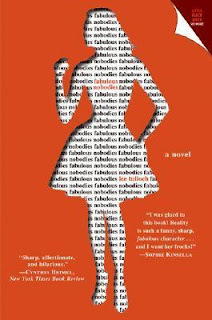
This hysterical read had me giggling like a schoolgirl, quite some years ago. Laugh? I nearly bought a round. Fabulous Nobodies is described as 'a lighthearted yet devastatingly accurate social satire about the hip young fashion slaves of New York City's East Village in 1983'.
The screen adaptation was recently optioned, to be directed by R.J. Cutler, acclaimed director of the fashion documentary The September Issue, featuring Anna Wintour
I happened across the paperback as I sifted through pre-loved fashion in my local op shop one melancholy morning and was instinctively drawn to the cover. Snatched it up for a song, took it under my wing and whisked it off home in the rain. It was ravenously devoured with a bottle of wine and a funny cigarette.
In retrospect I clearly turned to it for remedial purposes when events in my life were so intensely gloomy that my more serious reading material (particularly my edge worn Jean Rhys collection) was a definite no-no.
For years I worked and partied with real people like Really, nightclub 'door bitches' who thought they ruled the world and had a duty to keep naffly attired trash out.
Might have been imagining things, maybe it was my 'medication', but seem to recall Really's fabulous little frocks having some rather camp, ongoing daily dialogue with each other in their closet (?)
Silly, silly, silly, but there's nothing wrong with that occasionally. Laughter is good for the soul - but, as Really would no doubt caution us, watch out for those laugh lines!
Once you 'get' the intent of the silliness you begin to see through it into witty, intelligent, well written satire ahead of is time.
People have called it pre-chick lit chick lit but I beg to differ - far from some of the churned out formulaic pulp that ended up in the chick lit pile, this is original, clever and unique.
I flicked through it again just recently when rummaging through my cupboard and mused to myself that it had not dated. Lee Tulloch is a smart, entertaining writer who seemingly saw no need to linger in this genre once she had worked this little gem out of her system.
I'll be at the movie with bells on. Bravo! Encore!
My review of A Gambling Man: Charles II's Restoration Game, by Jenny Uglow
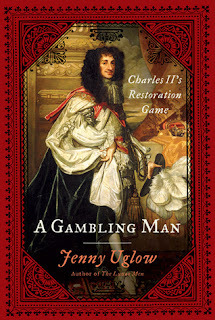
Restoration monarch Charles II I had long procrastinated reading on, until this splendid book appeared before me. At once admiring this elegant product, its cover art and back page snippets, I was compelled to take it home.
This great grandson of the executed Mary, Queen of Scots and son of the executed Charles I was invited to take the throne following the Interregnum.
Known as the Merry Monarch, his court was a den of hedonism, his subjects loving his looseness after the puritan Cromwellian protectorate, or de facto Republic. He sired a dozen acknowledged bastards by seven mistresses.
Charles II was not merely the most infamous royal sleazebag of them all, he was a respected patron of the arts and sciences and had his work cut out in restoring England's shaky monarchy and seeing his kingdom through several great disasters.
His watch saw London's Great Plague eliminate approximately 100,000 people, thinning the capital's population. Also the Great Fire of London, famously ignited in Pudding Lane and destroying over 13,000 houses, 80-odd churches and old St. Paul's Cathedral. The fire's aftermath saw Sir Christopher Wren add his splendid architectural mark to London's rebuilding, initiated by Chares II.
Charles also reinstated the theatre, initiating two acting companies and legalising acting for women, after a long puritanical spell wherein theatre was considered frivolous and banned altogether.
Leaving no legitimate heir, he was succeeded by his brother, the less popular, more zealously Catholic James II, whose short reign reached an abrupt halt when he was overthrown for producing a Catholic heir and suspected of aiming to steer then staunchly Protestant England religiously backwards.
I enjoyed studying this lovable, decadent, cultured rogue, whose mistresses included legendary orange-seller-turned-actress Nell Gwynn and notorious Barbara Villiers who bore five of his royal bastards.
While the Restoration is still not one of my favourite periods, Jenny Uglow lured me in, guided me well and made it accessible in a way no other has.
Recommended reading.



